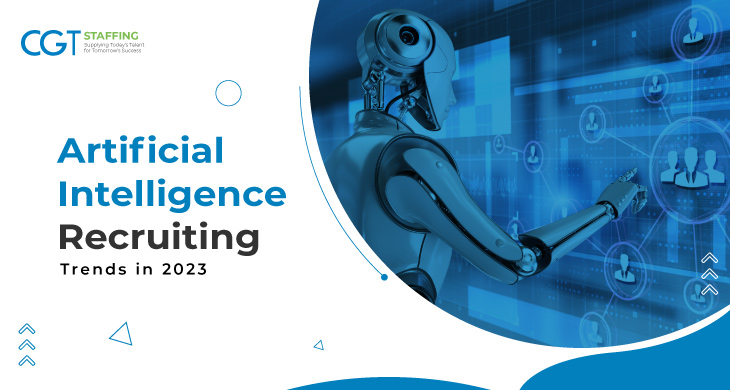Traditional recruitment processes are complex, time-consuming, and not without their shortcomings. The use of AI recruitment tools has successfully eliminated some of the stumbling blocks inherent to the traditional hiring processes. For that reason, organizations are now implementing Artificial Intelligence recruiting, and the trend is expected to gain momentum in 2024.
Hiring managers realize the fact that when equipped with smart AI resources they can complete tasks more efficiently, resulting in an overall increase in productivity.
Table of Contents
Importance of Artificial Intelligence Recruiting
AI recruiting saves time, human effort, and cost while improving the quality of new hires.
The following stats speak for the benefits yielded to both organizations and the candidates:
- Recruiters shared that AI is saving 67% of the time otherwise dedicated to traditional hire
- Such systems removed 43% of human bias
- Companies utilizing AI data see 56% higher retention rates
Popular AI Trends of Staffing
The following AI hiring trends are expected to grow in popularity in 2024:
Job Post Creation with AI
Companies often have to create job posts on multiple platforms when hiring. The wording and syntax of some postings may be confusing. AI applications can help write job posts in the most suitable language and tone, which can be especially helpful when accessing global talent relying on English as a second language.
Hiring managers can further leverage these smart applications for creating offer letters and appointment letters. Regardless of what strategies for talent acquisition an organization uses, such software can be of use in many other writing tasks.
Automated Vetting Processes
Hundreds of candidates submit their resumes to multiple postings. With so many unqualified resumes to go through, manual vetting is inefficient. AI recruiting software like ATS (Applicant Tracking System) parses resumes and identifies suitable candidates. Such programs save hours of work for recruiters, whether they are hiring an in-house team or offering third-party services like that of a staffing agency in Pittsburgh.
The use of AI for screening resumes and cover letters limits hiring bias by recruiters. Organizations can develop a more inclusive environment among different genders, races, and ethnicities by leveraging Artificial Intelligence recruiting.
Technical Assessments
Resumes are not entirely dependable sources of information about candidates. In some instances, advertised skills might be fabricated or exaggerated. Technical assessments provide hiring managers clarity on the skills of each candidate.
These applications have multiple assessment templates specially created for specific job roles. Some applications allow the creation of personalized tests. Departments can add questions about the required skills for candidate assessments.
More Data-Driven Recruitments
Predictive models and data-driven decisions have improved processes at organizations of every scale. Recruiters can use a similar approach with the data for smarter hiring decisions. AI recruitment tools like ATS and CRMs can help in compiling data for predictive models. Candidate data like past employment experience, learned skills, and behavior can help assess if they would be a good fit for a company.
HR departments of any new company can implement a recruitment model after doing a centralized vs decentralized recruitment comparison based on the data it generates and adopt a model that best suits the organization.
Smart Internal Mobility
According to a survey by IBM, 45% of positions are filled by lateral movement and promotions within an organization. Internal mobility bridges many gaps like saving time and cost in screening, hiring, and onboarding a resource.
Data-driven internal mobility allows companies to create smart profiles of candidates. AI software identifies the best candidate from within the current workforce to fill the newly created position.
Improving Candidate Experience with Recruitment Chatbots
Recruitment is a two-way process wherein both businesses and candidates are searching for the best option. With that in mind, engaging a candidate and answering their questions about the company and job role is crucial for an organization to secure a mutual best fit.
Smart recruitment chatbots powered by natural language processing and AI create a streamlined process of hiring and onboarding employees.
Conclusion
Artificial Intelligent recruiting tools and practices are revolutionizing and assisting recruiters at every step involved in hiring. The technology is yielding benefits to both organizations and candidates by streamlining hiring processes and removing hurdles, and consequently, growing the trends of AI-assisted hiring.
